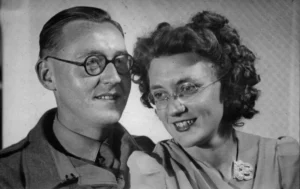David McCarthy (1924 -2024)
David McCarthy, eminence grise of Waterway Recovery Group’s North West regional group, known to everyone as ‘Mr. Mac’ died on 17th January 2024, exactly 40 days short of his hundredth birthday. With him went an era for WRG North West.
Born in Salford, he was brought up in Crumpsall and educated at Stand Grammar School. On leaving, he joined Barclays, staying with them until retirement, except for a period in the Army during the Second World War, when he was conscripted into the Royal Signals, subsequently transferring to the Royal Artillery Corps and serving in North Africa and Italy.
After the war, and following marriage to Nancy and the arrival of son Ian, he moved to Woodstock, his home (and to become the spiritual one of WRG NW) for the next 60 years, only leaving in 2014, when he followed son Ian and daughter Jane to Rossendale.
His interest in canals was aroused by a family boating holiday in the early 1960s, and he joined the Peak Forest Canal Society, not only working himself but supplying moral support and refreshments to the younger volunteers. The appearance of him and Nancy, bringing near infinite supplies of hot tea and only slightly more limited ones of broken biscuits, was never more welcome than during the clearance of the ‘Rochdale 9’ in the bitter early months of 1973.
[The photo shows Mr Mac in his camper van]


